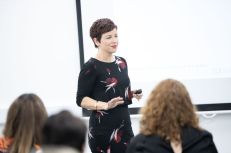
In her fantastic and relevant book ‘Emotional Agility -Get unstuck, Embrace Change and Thrive in Work and Life” Dr. Susan David reminds us of the importance of pausing to connect with ourselves.
We are on this planet for a short time and study after study shows that having a strong sense of what matter to us leads to greater happiness. By knowing who you are and what you stand for, you come to lifes’ choices with the most powerful tool of all; our full selves.
When we connect with our real selves and what we believe to be important, the gulf between how we feel and how we behave closes up.
Enter Emotional Agility. This is a process that allows us to be in the moment, changing or maintaining our behaviours that are aligned with our intentions and values. The goal of Emotional Agility is to keep our sense of growth and challenge alive and is built around a 4 step process. These are:
- Step 1: Showing Up: Becoming curious about our thoughts and emotions and facing them with kindness. Asking ourselves who’s in charge the thinker or the thought?
- Step 2: Stepping out: Detaching ourselves from our emotion. As coaches we are skilled at supporting our clients in intentionally creating a space between stimulus and response as therein lies our power of choice. Paying attention to what we are thinking or how we are feeling is paramount in helping us to create that space e.g. I’m noticing that I’m feeling …
- Step 3: Walking Your Why: In a world where we are expected to approach our day to day tasks like an endless ironman competition, it’s necessary to take the time to evaluate what truly matters to us, otherwise we leave ourselves victim to circumstance. Identifying and acting on the values that are your own is crucial to E.A.
- Step 4: Moving On: The ability to make small but intentional changes in our motivation, our mindset and our behaviours that are aligned with our values can make for transformational change in how we navigate our world.
Our ability to be nimble to meet lifes’ every changing demands is important, however, if we are not taking time to intentionally connect with our priorities or even observe our own narrative, we leave ourselves victims of circumstance or more tragically, randomness!
I absolutely loved this book, being emotionally agile in our lives empowers us to be adaptable, to face our emotions with courage, curiosity and compassion and move on from them!




